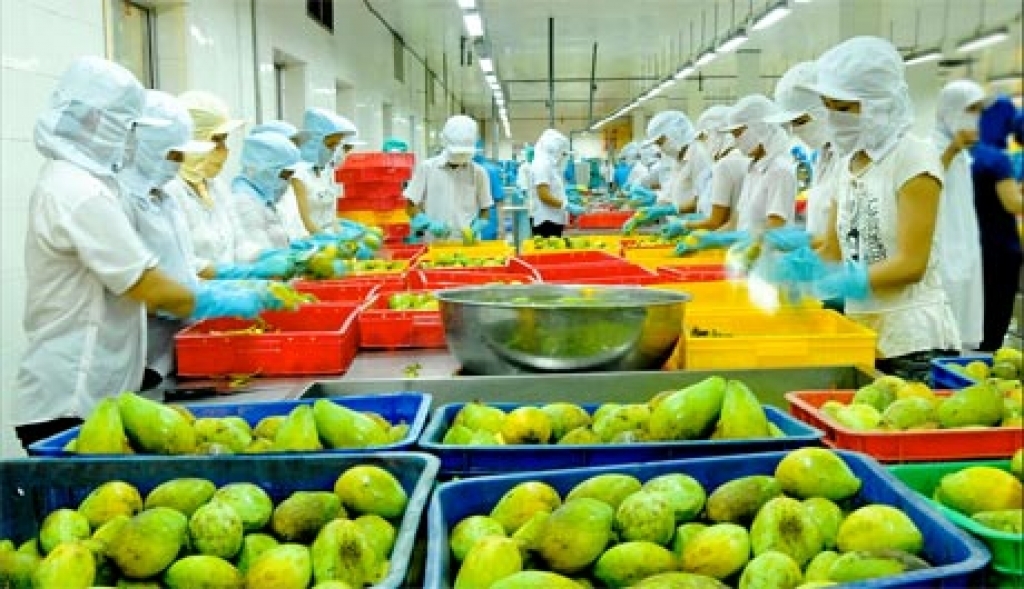Factors for Vietnamese agricultural produce to successfully break into UK market
 |
| Vietnamese agricultural products have rosy prospects of increasing exports to the UK after the UVFTA |
The first batch of longan of the 2021 season from the northern Highlands province of Son La has just arrived to the UK and the EU, paving the way for further batches of fresh fruits to enter these demanding markets from the province.
Earlier, local firms exported several shipments of rice and coffee to the UK to take advantage of the UK-Vietnam Free Trade Aagreement (UVFTA) which came into force at the beginning of this year.
So far, despite zero tariffs on fruit and fragrant rice, shipments to the UK have been of a small value and reached the UK with support from new importers.
For instance, Vietnam National Seed Group (Vinaseed) shipped 60 tonnes of fragrant rice to the UK through privately-held Long Dan, which is owned by Vietnamese people and is based in the UK.
| Local agricultural products could only make successful forays into UK market once local producers exercise production following Global GAP or EURO GAP standards and apply globally recognised management systems like ISO, or SA. |
Before the UVFTA, the UK applied 17.4 per cent import tariff on Vietnamese fragrant rice (Jasmin), which has been abolished as of the beginning of this year, helping to bolster the competitiveness of Vietnamese rice
According to the Ministry of Industry and Trade’s Agency of Foreign Trade, Vietnam posted $2.85 billion of export turnover to the UK in the first six months of 2021, a nearly 28 per cent jump against the year prior. The growth was deemed quite positive thanks to the UVFTA.
The UK imports more than $700 billion of goods each year, of which Vietnam accounts for less than 1 per cent, which means there is definitely room for growth.
Last year, the UK imported more than 5.7 million tonnes of vegetables and fruits alone, valued at approximately $9 billion. The export value of such products from Vietnam to the UK only reached $11.6 million, 0.18 per cent of this.
As for rice products, last year the UK imported around 762,526 tonnes. Vietnamese exports made up 3,396 tonnes with a value of nearly $1.3 million, only 0.45 per cent of the total.
The finest agricultural export item to the UK is cashew nuts. According to figures from Vietnam's trade office in the UK, last year the country imported 23,000 tonnes of cashew nuts, with more than 16,000 tonnes coming from Vietnam, accounting for 71 per cent.
Pepper exports are also upbeat. Last year, Vietnam shipped 5,621 tonnes of pepper to the UK, raking in $48 million of the total 14,000 tonnes and $121 million that the UK imported.
According to Nguyen Canh Cuong, trade counsellor at the Vietnamese Embassy to the UK, Vietnamese agricultural produce is gaining a foothold in the UK, with coffee, cashew nuts, and pepper selling well in big supermarkets while rice and fruits (longan, litchee, and dragon fruit) are mostly sold in minimarts.
Cuong noted that Vietnamese agricultural items have an edge in the UK over similar products from countries which have not yet signed an FTA with the UK. Local firms, however, can only avail of these competitive advantages if they can reach UK quality standards and match customer taste.
Industry experts noted that although the UK is a big market and the UVFTA has come into force, local firms need to take quicker actions to capitalise on this agreement, as the UK is also actively pursuing FTAs with other big trading partners. The country might also join the Comprehensive and Progressive Agreement for Trans-Pacific Partnership (CPTPP) in the not so distant future.
Competition would therefore mount up, even as Vietnamese producers are working to reach stringent quality requirements such as Global GAP or EURO GAP standards and apply globally recognised management systems like ISO or SA.
In addition, the firms must ensure stability in both quality and quantity to develop sustainable relations with UK partners while simultaneously having suitable market access strategies.
What the stars mean:
★ Poor ★ ★ Promising ★★★ Good ★★★★ Very good ★★★★★ Exceptional
Themes: EVFTA & EVIPA
Related Contents
Latest News
More News
- Rising consumption and travel fuel ‘Tet season’ stocks (February 11, 2026 | 11:43)
- Education as strategic capital: why Dwight School Hanoi represents a long-term investment in Vietnam’s future (February 10, 2026 | 19:00)
- Green logistics–the vital link in the global energy transition (February 09, 2026 | 19:35)
- Wages and Lunar New Year bonuses on the rise (February 09, 2026 | 17:47)
- Temporary relief for food imports as businesses urge overhaul of regulations (February 07, 2026 | 09:00)
- Opella and Long Chau join forces to enhance digestive and bone health (February 06, 2026 | 18:00)
- Vietnam-South Africa strategic partnership boosts business links (February 06, 2026 | 13:28)
- Sun PhuQuoc Airways secures AJW Group support for fleet operations (February 06, 2026 | 13:23)
- Pegasus Tech Ventures steps up Vietnam focus (February 05, 2026 | 17:25)
- The generics industry: unlocking new growth drivers (February 04, 2026 | 17:39)

 Tag:
Tag:


























 Mobile Version
Mobile Version